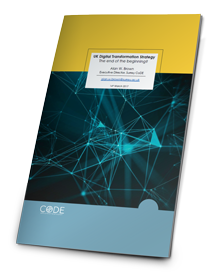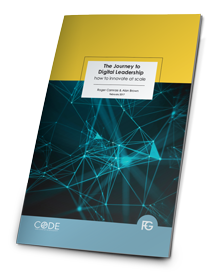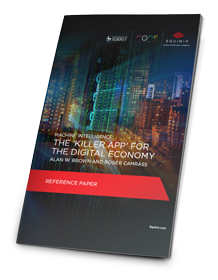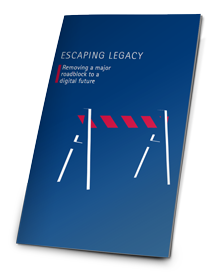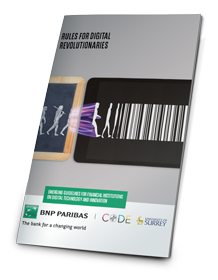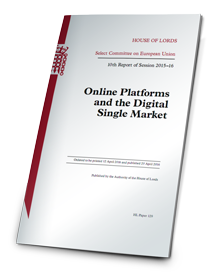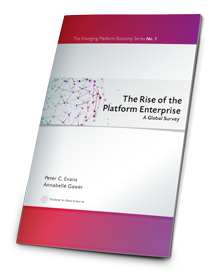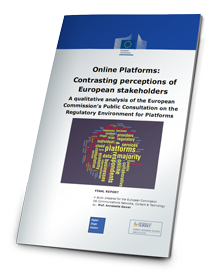
Every business is now a
Digital Business
About Surrey CoDE
WHAT MAKES US TICK
The University of Surrey’s Centre for the Digital Economy (CoDE) investigates the emerging patterns of the Digital Economy through a process of Collaborative Discovery that blends research, education, problem-solving and brokering. We engage in this process with enterprises large & small, researchers and students in our Business Insights Lab.
We explore topics such as digital platforms, emerging business models, distributed ledger technologies, and Agile innovation by combining cutting-edge business experimentation with classic methods of research. We believe that Collaborative Discovery will help us navigate – together – a world that is uncertain, unpredictable and unrecognisable to traditional business models.
Designing effective organisations and institutions for the digital economy is the grand challenge for our time.
Research and development
CoDE is exploring the broad economic, organizational, and behavioural changes brought about by the advance and spread of digital technology.
A complete digital landscape
Because of our alignment with University of Surrey at the Surrey Business School, CoDE is uniquely equipped to tap cutting-edge research across disciplines, and help navigate a business world that is uncertain, unpredictable, and unrecognisable to traditional business models.
Every business is now a digital business; every budget is an IT budget. This is because the constant stream of digital technology changes, optimised production practices, and flexible global delivery models has quietly turned into a revolution in business models, consumer expectations, and societal behaviours.
CoDE is not about IT, or about digital technology: it’s about the ‘ecology’ of technology – how Digital transforms not only what can be done, but how it is done, and by whom – and the threats and opportunities this poses for business, government, and society.
Latest news
from our blogWho We Are
CODE MEMBERSResearch/Teaching Staff
Dr Masoud Fakhimi
Prof. David Frohlich
Mr. David Griffin
Dr. Beth Kewell
Dr Milosz Miszczynski
Dr. Davide Morelli
Mr. Jim Sears
Prof. Lampros Stergioulas
Dr. Mahdi Tavalaei
Visiting Staff
Dave Birch
Roger Camrass
Mandy Chessell MBE
Dr. Jerry Fishenden
Dr. Sally Howes MBE
Bill Payne
Stephan Thoma
Dr. Mark Thompson
Executive Viewpoint
LATEST INDUSTRY REPORTSThe Age of Peak Mobility Report
The majority of an average UK mobile worker’s time (70%) is spent on everything but their job, instead it’s spent on time consuming administration, travel and meetings. But with an increasing need for services this productivity crisis is reaching breaking point.
The research suggest that a solution is urgently needed. 95% of organisations believe technology will be key to improving productivity, technology like dynamic scheduling and mobile workforce management.
UK Digital Transformation Strategy – The end of the beginning?
Whether it is encouraging new digital businesses to grow or helping traditional businesses to transform in a digitally-enabled world, creating the conditions for the UK to be at the forefront of digital economy activities is now at the top of the Government’s agenda. And it is seen by businesses as essential to their future survival.
This paper focuses on concerns that are exacerbated with the most recent trends and directions, pulling at the core of established business and cultural norms.
The Journey to Digital Leadership – how to innovate at scale
Much confusion abounds at Board level today as to what is meant by digital, and we suspect that there is little consensus amongst many Board members about what to do next, despite the barrage of press and consulting speak announcing and promoting ‘Industry 4.0’.
Our paper sets out a context for digital leadership – why senior executives should take this subject seriously now (rather than postpone any activity); what digital leadership might mean for them; and how to take the first steps on a digital leadership journey.
The IT function – step-up or step-out!
In today’s fast moving world of IT Consumerisation, Big Data and Everything “as a Service” the IT function is becoming sandwiched precariously between two rapidly changing environments.
In this report, we describe the nature of digital disruption within the IT supply chain (both supply and demand), the necessary changes required to ensure that the IT function continues to add value to its business partners, and five specific steps to establish a new and more effective IT organisation that aligns with the needs of successful digital businesses.
CoDE Reports
OUR LATEST PUBLISHED RESEARCHDigital Interconnectivity: A Reformation of the Banking Sector
Even with the multi-billions of dollars invested so far in FinTech, little has changed for the average banking customer. Yet the banking sector cannot remain impervious to the digital disruption that has permeated virtually every other area of commerce.
This report illuminates the most likely direction of travel in the banking sector enabled by digital technologies such as interconnectivity, cloud-based computing, mobility, data analytics, distributed ledger technology and web-based service-centric IT architectures. In our view, major elements of the banking sector will undergo massive digital transformation over the next 5-10 years. This will create many new opportunities for both retail and commercial customers.
Machine Intelligence: The ‘Killer App’ for the Digital Economy
The challenges and opportunities for senior executives in harnessing the power of new digital technologies such as Machine Intelligence.
In this report we identify the missing link between a surfeit of information on every aspect of our economic and personal lives, and an effective means of harnessing an almost limitless data resource. This missing link is called ‘Machine Intelligence’ or ‘MI’ and combines a range of technologies such as machine learning, natural language recognition, and artificial intelligence.
Escaping Legacy
Removing a major roadblock to a digital future
Core legacy systems inhibit business’ ability to meet changing customer demands in the digital age. The scale and nature of the problem is such that it needs to be addressed now. Our Survey suggests that it is addressable without the need for large-scale multi-year programmes to re-write these applications.
Rules for Digital Revolutionaries
Emerging guidelines for financial institutions on digital technology and innovation
In setting up our Innovation & Digital Lab in the summer of 2016, one of our key objectives has been to help clients better navigate the ever-changing digital world. For financial services organisations in particular, the pace of digital change is vast and sometimes it is difficult to know how to embrace the topic.
Online Platforms and the Digital Single Market
Published by the Authority of the House of Lords
Online platforms, which comprise a wide range of software-based technologies, from search engines and social networks to price comparison websites and collaborative economy platforms, are drivers of growth, innovation and competition. They enable businesses and consumers to make the most of the opportunities created by the digital economy. Supported by the emergence of mobile devices and pervasive wireless connectivity, online platforms have transformed how we live, interact and transact. In doing so they have disrupted existing sectors of the economy and challenged regulatory frameworks.
The Rise of the Platform Enterprise
A Global Survey
Enterprises that leverage the power of platform business models have grown dramatically in size and scale over the past decade. No longer the sole domain of social media, travel, books or music, platform business models have made inroads into transportation, banking and even healthcare and energy. Platforms are now active in North America, Europe, Asia, Africa and Latin America. Some platforms are household names such as Amazon, Apple, Google and Alibaba. Others have emerged more recently or hail from parts of the world that get less attention such as Rakuten (Japan), Delivery Hero (Germany), Naspers (South Africa), Flipkart (India) or Javago (Nigeria). Platform ecosystems are gaining ground through the digitalization of products, services and businesses processes and in the process are reshaping the global landscape.
Online Platforms: Contrasting perceptions of European stakeholders
A qualitative analysis of the European Commission’s Public Consultation on the Regulatory Environment for Platforms
This report analyses the answers to 8 open questions in the European Commission’s public consultation on platforms. Themes included the definition of platforms, platforms’ treatment of suppliers and customers, constraints platforms face when expanding their business in the EU, and their handling of consumer data.
























